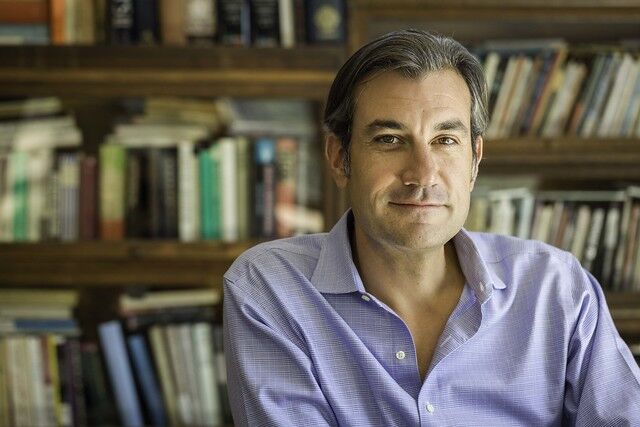Unlike the churning shit-show-roar of whatever
that was we just left behind, this year, online
chatter tells me, will be one of contemplation
and hope. Maybe. Right now, I’m holding still
the best I can, having followed once again this
same path to this same hill with its one tree
I can’t name, accompanied by Gloria the pug,
harbinger of nothing, prowl-snorting for any scrap
she can find. I’m trying to hold still, to allow some
of what the world gives back just now to summon
a faith in change—pug pant, wind rummaging
branches, bird fussing with a length of yarn,
Pleasant Street traffic slosh—but truth be told
this half-ass attempt at mindfulness isn’t offering
much. Last week, I wrote to a friend whose
husband’s body has betrayed him again and, as if
I’d forgotten the way words work, was surprised
how weightless each one seemed. Language,
a poet once wrote, is like windchimes catching
the sound of the larger, more essential thing,
meaning the point is not the chimes. Sure, I get it,
although there are days when the wind seems
like nothing more than wind, its pockets long-
emptied of secrets, offering up bits of faltering
melodies as it moves past trees and the metal
tubes we’ve hooked into branches in the hope
of creating song. Once, the wind made something
I could call music whenever it slipped through
the wooden slats of the hutch my father built
for Penelope, the rabbit our dog dragged home
from a den she raided in what must have felt
like glee. I can’t remember why she was called
Penelope—the name, once spoken aloud, became
what she was called—or what part of the story,
if any, it matters now to tell: milk pearling from
an eye-dropper, the way she’d wait, trembling
in summer heat before lunging, teeth-bared,
for my outstretched hand, or how in the end
we gave her away to an amateur magician
named, hand to god, Shrimplin the Mysterious,
after which her life took a turn for the worse.
Don’t worry, Matt, my friend told me when
Gloria first came into our world, there will come
a time when you’ll no longer feel embarrassed
to own a pug. For better or worse, that day arrived
a while back. For better or worse, none of this
has much to do with shame, although it’s always
somewhere in the mix, whenever I’m writing a poem
or standing on a hill on New Year’s Day instead of
offering a friend even the patchy solace I have
to give. In “The Darkling Thrush,” Thomas Hardy
welcomes the new year with the bleakest of tidings
in which there’s no hope beyond one scrappy bird
giving voice to what’s described as joy. Years ago,
I tried to memorize it as a means of killing time while
driving to be in the arms of a woman I thought I knew
how to love. Those were days when I didn’t think
much about the words I chanted aloud while careening
dark Pennsylvania roads in a borrowed minivan,
hauling coffee breath and a belief that abstractions
like hope and love doomed any poem unless,
like Hardy, a virtue was named only to proclaim
its absence. These days, I’m less sure. These days,
I hope I can tell the difference between words we need
and words I choose to keep a poem lurching along.
Windchimes is one. Hutch is another. I don’t know
much about Hardy or birds, but enough to remember
his poem was first leashed to the god-awful title
“By the Century’s Deathbed,” and that there’s not
a thrush alive which understands the idea of hope—
any song the poet heard would have been about
laying claim to breeding territory, meaning fuck-off
would be a closer translation than joy toward
what’s coming next. Whatever’s next, it will be
most likely some version of Penelope’s story—
not my long-gone rabbit, but her Odyssey namesake:
days unmoored with both waiting and making,
followed by a shit-ton of unraveling, sometimes by
the same hands. Or not. Hope, I’m told, doesn’t mean
latching to the idea that everything will be fine, but
admitting the future’s unknown. “Dear lumbering
unreadable world” I wrote in early drafts of this poem,
unsure who else to tell that I too sometimes find
grace only after taking a word like “deathbed”
and, without shame, swapping it out for some
fleeting thing. It took a long time—far longer
than it should have—to remember the world
isn’t listening, which leaves, for now, only me
and you and this goofball pug (that resembles—
let’s be honest—the unholy offspring of a gremlin
and weasel) and, yes, that one bird I glimpsed
across the field, whether or not it ever lets loose
with a fuck you trill or just keeps beak-tugging
at its length of yarn without any hint of song.
